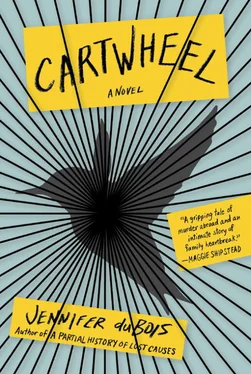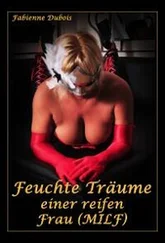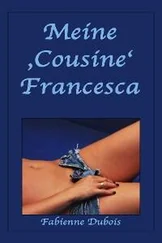Anna was seething. “You’re being a fucking asshole, Dad.”
“Okay. You got me. I’m an asshole. We’re all down here trying to help your sister hang on to her life just to torment you. Because it’s my idea of a good time. Because I’m an asshole.”
“You know that isn’t what I mean.”
“Well, what do you mean, exactly? Please elaborate. We’ve got all the time in the world, Anna. We certainly don’t have any bigger concerns right now.”
Anna screamed at him then, swore and screamed like she never did during her adolescence, though Lily sometimes had, and then slammed out of the room. And Andrew sat on the bed for a time, patting himself on the chest, as though he could smooth over the divots that had lately been gouged into his heart.
· · ·
Andrew went downstairs a few hours later, ready to broker some kind of stopgap peace. He knocked on Maureen’s door and she appeared.
“Hi,” she said.
Something about seeing Maureen when he’d expected Anna made Andrew consider her face anew: the fractal lines around her eyes, woven like bits of tapestry; the way they somehow made her eyes seem brighter by contrast. He was relieved to see that she had not been crying, at least not recently.
“I can’t leave,” said Andrew, surprising himself. It was not at all what he’d thought he was going to say.
“What?” Maureen held open the door. Andrew stepped over a pile of Anna’s gym clothes and into the room.
“I just can’t,” he said.
“Because she cut her hair? We’ve got bigger problems than that.” Maureen went to the window and opened the curtain. In the gray wash of light, Andrew wasn’t sure whether he could actually see the red in Maureen’s hair. Maybe he only sensed it, like a pentimento from an abandoned painting.
“Anyway, we’ve talked about this,” said Maureen. “You have to go back. That’s where your life is.”
“Is it?” said Andrew fretfully. “I don’t know. It keeps moving around.”
“Maybe you’re just misplacing it.” Maureen sat on the unmade bed. “The wages of age, you know.”
“It wouldn’t be the only thing, these days.” Andrew joined Maureen on the bed. He rocked his shoulders through their sockets. “Your daughter’s mad at me,” he said after a moment.
“I know.”
“I see,” said Andrew grumpily. “She said something?”
“What was it about?”
“Surely you already know that, too.”
“I don’t. Really.”
Andrew stared into the silent television screen. There was something oddly comforting about this; he felt a sudden, unreasonable hope that it might materialize into an oracle and offer up a prophecy. “She said something about Lily,” said Andrew. “She said something about her killing an animal.”
“Oh,” said Maureen mildly. “Did she mean the slug?”
“What?” said Andrew. “Yes. Why didn’t I know this?”
“I don’t know.”
“I mean, why does absolutely everyone else know this? It is not an exaggeration to say that this has probably been literally on the evening news. I don’t understand why I didn’t know this.”
“Me, neither. She cried about it for, like, a week.”
“Why did she do it, then?”
“I have no idea.”
“Well, anyway,” said Andrew darkly after a moment. “A slug isn’t really an animal.”
“No.”
“I actually think it’s pretty misleading of Anna to characterize a slug as an animal.” Andrew closed his eyes. “I have to wonder if she’s actually pretty angry at Lily.”
“I’m sure she is,” said Maureen. “I mean, aren’t you?”
“Mad at her? No. Why would I be?”
“Well, she’s made some pretty dumb decisions.”
“She’s a kid.”
“She’s made some pretty dumb decisions even for a kid. She’s done things we wouldn’t have done at her age. She’s done things Anna wouldn’t have done.”
“I suppose.”
Maureen sighed. “It’s just—you really do want them to turn out to be smarter than you.”
“Of course,” said Andrew mournfully. “I mean, what’s the point otherwise? That’s the whole thing. Just saying, okay. We’ve tried, we’ve done our best with ourselves and our lives, we’ve done all right. But the best hope is that something else might do better.”
“You cede your competence to its next incarnation,” said Maureen. “That’s why it’s so terrible and astonishing.”
“And boring,” said Andrew. “With Lily, at least.”
“It was boring! She was such a boring baby, wasn’t she?” Maureen laughed. “Why was that? Is that an awful thing to say?”
“Babies are boring when you’re not terrified, I guess,” said Andrew. It was true. Janie had probably been boring, too, but they’d been too scared to notice. “Being mortally terrified will make anything interesting. Bet you’re not bored now, are you?”
“Nope! Riveted!” Maureen laughed again. “Oh, we don’t have the best luck, do we?”
“Not the absolute best.” Andrew was saying, “One could imagine better”—but then he stopped talking because he and Maureen were kissing. He had not noticed that they were going to kiss. Perhaps there had been a brief fillip of intention—perhaps his hand had been on her face momentarily—before it happened. But it would be impossible to say for sure whose fault it was; they both maintained plausible deniability, he felt, throughout. The rest was muscle memory; a routine so routine that it was elevated nearly to ritual. All the thousands of times they had done this. It was strange the things you still remembered, whether you wanted to or not. They were like aging dancers performing the first ballet of their youth, just to see if they still knew how.
Afterward, they slept. For the first time since arriving in Buenos Aires, Andrew did not dream.
On Thursday, Ignacio Toledo was apprehended in Ciudad Oculta.
He was not the kind of person Eduardo had been expecting. It was difficult, in fact, to tell what kind of person he was at all. Toledo appeared in Eduardo’s office wearing a heavy brown coat that he declined to remove, even though the air was stifling. Unlike most paco fiends Eduardo had known, he was not jangling with the twitchiness of a nervous system with broken shocks, nor was he particularly derelict; it was hard to imagine him standing around a prison yard, cooking kerosene and sulfuric acid on a spoon. In one light, in fact, Ignacio Toledo actually seemed to possess an odd sort of charisma: He had lazy half-open eyes and the kind of carved, rugged features that seemed to speak of great masculine stoicism. When you first glanced at him, you saw a person who might have been a lover to Katy, or to Lily, or to both; a person who might even—maybe—have inspired lethal passions in one of them.
But then you blinked, and when you looked at Ignacio Toledo again, you saw something else. You noticed that he had bags under his eyes the shape and color of fire bellows, that his teeth looked like they were older than he was; you noticed that his gaze was somehow jumpy and leering simultaneously. Or was it? Eduardo was not sure. Uncharacteristically, when it came to Ignacio Toledo, Eduardo was not quite sure about anything. Even Toledo’s appearance without a state-appointed lawyer was difficult to unpack. With Lily, that decision had been born of a naïveté that was arrogant to the point of suicide, and maybe something similar was at work here. Or maybe it was more calculated with Toledo—perhaps this decision arose from the idea that accepting a lawyer was a tacit admission of guilt. But this was only a different kind of naïveté, ultimately, and there were moments when Eduardo wondered if Ignacio Toledo was purposefully inviting Eduardo to believe in either kind. Eduardo did not know and was not moving toward knowing; every time he found himself approaching a sense of Ignacio Toledo, something about him shifted—so subtly, so apparently guilelessly, that Eduardo could never be totally sure that there’d been any change at all. It was like catching a fractional glimpse of a fish through the reeds, turning back only in time to be sure of the motion—which may have been, after all, only your own shadow on the water.
Читать дальше












